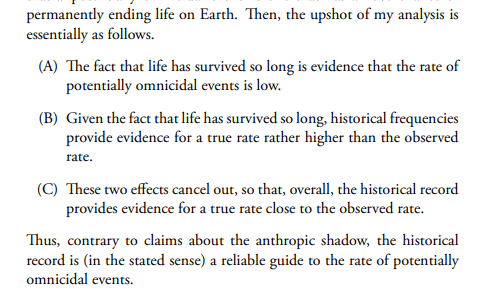This is a linkpost for Dispelling the Anthropic Shadow by Teruji Thomas.
Abstract:
There are some possible events that we could not possibly discover in our past. We could not discover an omnicidal catastrophe, an event so destructive that it permanently wiped out life on Earth. Had such a catastrophe occurred, we wouldn’t be here to find out. This space of unobservable histories has been called the anthropic shadow. Several authors claim that the anthropic shadow leads to an ‘observation selection bias’, analogous to survivorship bias, when we use the historical record to estimate catastrophic risks. I argue against this claim.
Upon a first read, I found this paper pretty persuasive; I'm at >80% that I'll later agree with it entirely, i.e. I'd agree that "the anthropic shadow effect" is not a real thing and earlier arguments in favor of it being a real thing were fatally flawed. This was a significant update for me on the issue.
Anthropic shadow effects are one of the topics discussed loosely in social settings among EAs (and in general open-minded nerdy people), often in a way that assumes the validity of the concept[1]. To the extent that the concept turns out to be completely not a thing — and for conceptual rather than empirical reasons — I'd find that an interesting sociological/cultural fact.


Nice, I feel compelled by this.
The main question that remains for me (only paranthetically alluded to in my above comment) is:
I think the answer to the first question is probably "yes" if we look at a reference class that changes over time, something like R_t = "people alive at period t of development in young civilizations' history".
I don't know about the answer to the second question. I think R_t seems like kind of a wild reference class to work with, but I never really understood how reference classes were supposed to be chosen for SSA, so idk what SSA's proponents thinks is reasonable vs. not.
With some brief searches/skim in the anthropic shadow paper... I don't think they discuss the topic in enough depth that they can be said to have argued for such a reference class, and it seems like a pretty wild reference class to just assume. (They never mention either the term "reference class" or even any anthropic principles like SSA.)